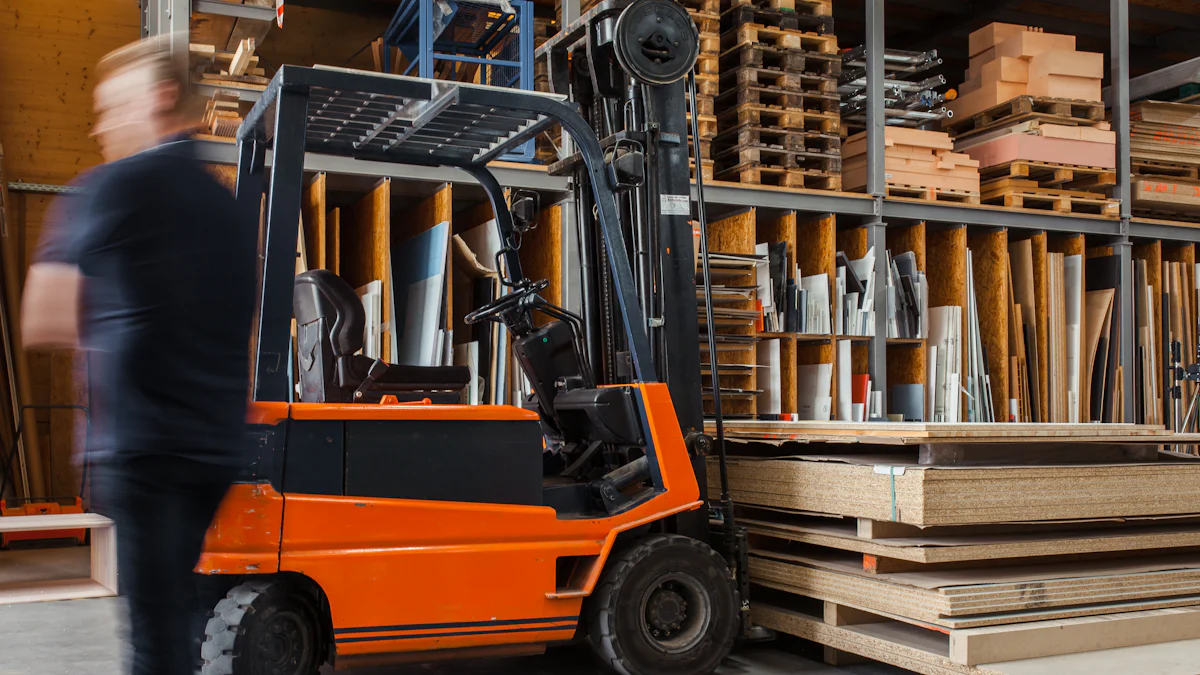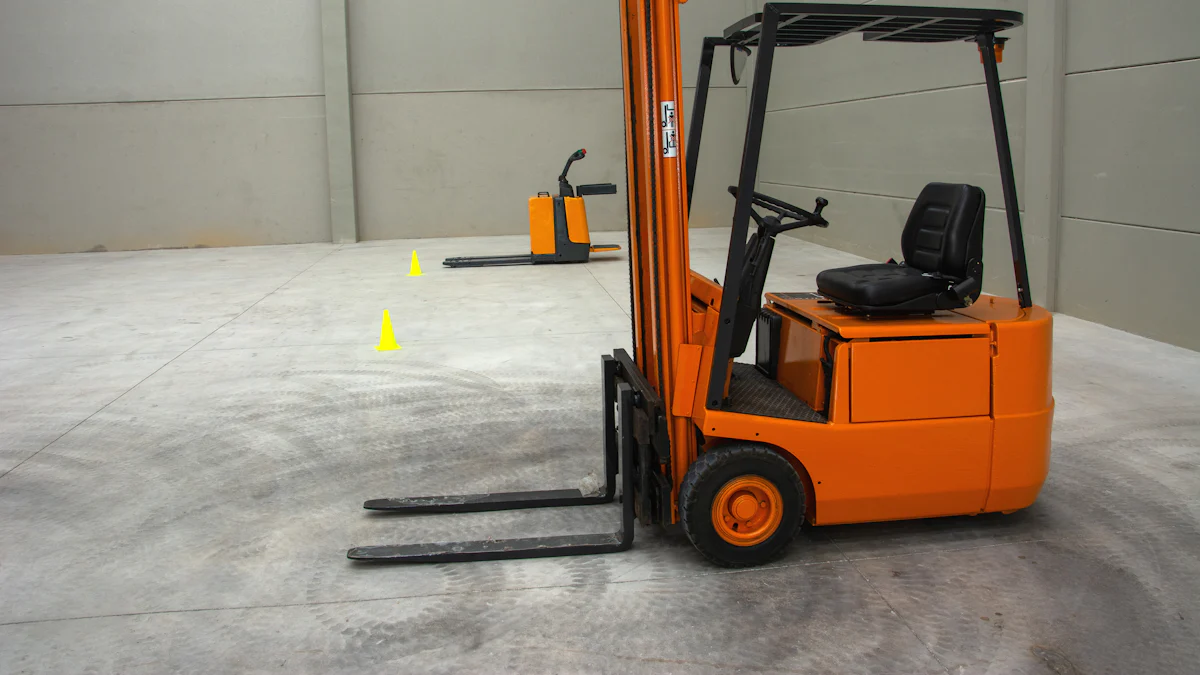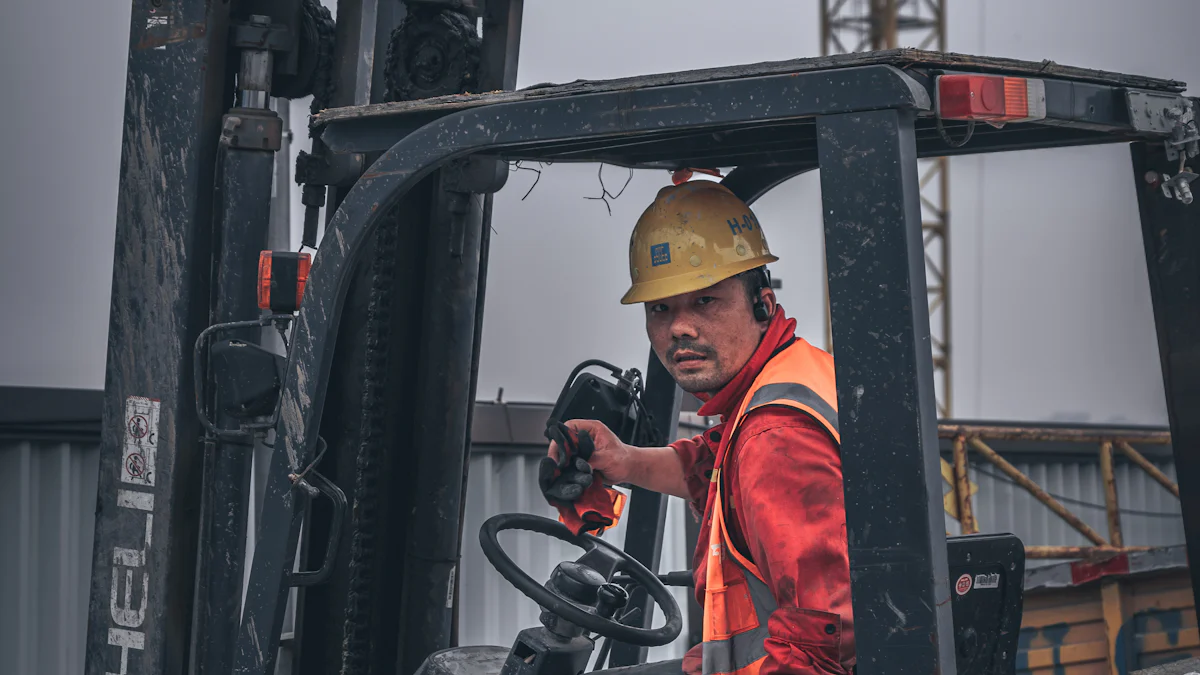
In the bustling world of warehouses, selecting the perfect equipment is paramount for seamless operations. Fork lift pallet jack and forklifts stand out as contenders in this arena, each with distinct advantages. Fork lift pallet jack excel in navigating tight spaces with ease, while forklifts boast the strength to handle hefty loads effortlessly. This blog aims to guide readers in making an informed choice tailored to their unique warehouse requirements.
Overview of Pallet Jacks

What is a Pallet Jack?
Pallet jacks, also known as Manual Pallet Jacks, are essential tools in the warehouse world. These heavy-duty pieces of equipment require approximately 15 strokes to reach an 8-inch lift height. The repetitive movements involved can put a significant strain on the operator’s hands, arms, shoulders, and back, especially after a long day. At MightyLift, they realized that by reducing the number of strokes needed, they could decrease the labor, time, and fatigue required to lift a jack.
Definition and Basic Features
- A pallet jack is designed for lifting and moving pallets efficiently within a warehouse.
- It requires manual operation and offers a load capacity of up to 3800 lbs.
- The construction involves steel material with sealed ball bearings for durability.
Types of Pallet Jacks
- Standard Pallet Jack: Ideal for general-purpose use with a load capacity suitable for most warehouse tasks.
- High-Lift Pallet Jack: Offers increased lift height capabilities for handling taller loads effectively.
Advantages of Pallet Jacks
Pallet jacks provide several advantages that make them indispensable in warehouse operations:
Maneuverability in Tight Spaces
- Operating a pallet jack requires minimal training due to its straightforward controls.
- They excel in navigating through narrow aisles and tight spaces effortlessly.
- The polyurethane wheel material ensures smooth movement even in confined areas.
Cost-Effectiveness
- Pallet jacks are simple and cost-effective tools compared to more complex machinery like forklifts.
- Their manual operation reduces maintenance costs associated with electrical components.
- Investing in pallet jacks can lead to long-term savings while maintaining operational efficiency.
Limitations of Pallet Jacks
Despite their benefits, pallet jacks have certain limitations that users should consider:
Weight Capacity
- While pallet jacks offer decent load capacities, they may not be suitable for extremely heavy loads exceeding their limits.
- It is crucial to assess the weight requirements of your warehouse tasks before choosing a pallet jack.
Distance and Speed
- Pallet jacks are ideal for transporting loads over short distances within a warehouse setting.
- If your operations involve covering longer distances at higher speeds, other equipment options might be more suitable.
Overview of Forklifts

What is a Forklift?
Definition and Basic Features
Forklifts, also known as industrial trucks, are powerful machines designed to lift and transport heavy materials within warehouses. These mechanical marvels come equipped with forks that can be raised or lowered for efficient loading and unloading operations. The robust structure of forklifts ensures durability and reliability in handling various tasks.
Types of Forklifts
- Electric Counterbalance Forklift: This type of forklift operates using electric power, making it environmentally friendly and suitable for indoor use.
- Propane Forklift: Propane forklifts offer versatility across different weight classes, ensuring there’s a perfect match for every job requirement.
Advantages of Forklifts
Higher Weight Capacity
- Forklifts boast an impressive weight capacity, allowing them to lift and move substantial loads with ease.
- Their sturdy build enables them to handle heavier items efficiently, enhancing productivity in warehouse operations.
- With various attachments available, forklifts can adapt to different tasks beyond basic lifting functions.
Versatility in Tasks
- Forklifts are not limited to pallet handling; they can perform a wide range of functions such as loading and unloading trucks, stacking goods at heights, and transporting various types of cargo.
- The flexibility of forklift attachments enhances their utility in diverse warehouse settings, making them indispensable tools for material handling tasks.
Limitations of Forklifts
Maneuverability in Tight Spaces
- Despite their capabilities, forklifts may face challenges when operating in narrow aisles or confined spaces due to their larger size compared to pallet jacks.
- Maneuvering a forklift requires skill and caution to avoid collisions or disruptions in the workflow within compact warehouse environments.
Higher Costs
- Investing in a forklift involves higher initial costs compared to simpler equipment like pallet jacks due to their advanced features and capabilities.
- Maintenance expenses may also be higher for forklifts, considering the electrical components and specialized parts they contain.
Comparative Analysis
Weight Capacity
When comparing pallet jacks and forklifts in terms of weight capacity, it’s evident that each serves a unique purpose.
- Pallet jacks are designed for handling lighter loads efficiently, typically up to 5,500 pounds. Their cost-effective nature makes them ideal for smaller tasks that don’t require heavy lifting capabilities.
- On the other hand, forklifts excel in lifting and moving substantial loads with ease. With their impressive weight capacity, forklifts are the go-to choice for tasks that involve heavier items and require enhanced productivity.
Maneuverability
In the realm of maneuverability, pallet jacks and forklifts showcase distinct characteristics tailored to different warehouse needs.
- Pallet jacks, known for their agility in navigating tight spaces, offer unmatched ease of movement within narrow aisles. Their simplicity and compact design make them perfect for quick maneuvers in confined areas.
- Conversely, while forklifts may face challenges in tight spaces due to their larger size, they shine in versatility across various tasks beyond basic pallet handling. The ability to adapt to different functions enhances their utility in diverse warehouse settings.
Cost Considerations
When it comes to cost considerations between pallet jacks and forklifts, understanding the financial implications is crucial for making an informed decision.
- Pallet jacks, with their lower purchase and maintenance costs, present a cost-effective solution for handling smaller loads without vertical stacking requirements. Investing in pallet jacks can lead to long-term savings while maintaining operational efficiency.
- In contrast, while forklifts involve higher initial costs due to their advanced features and capabilities, they offer a higher capacity for lifting and stacking tasks in various conditions. Maintenance expenses may be higher compared to pallet jacks but are justified by the versatility and strength they bring to warehouse operations.
Suitability for Different Warehouse Needs
Small Warehouses
In the realm of small warehouses, the choice between a fork lift pallet jack and a forklift can significantly impact daily operations. For compact spaces with limited storage capacity, the fork lift pallet jack emerges as a hero, offering seamless maneuverability and efficient load handling. Its compact design allows it to navigate through narrow aisles with ease, ensuring that no corner of the warehouse is left untouched. The cost-effectiveness of the fork lift pallet jack makes it an attractive option for smaller tasks that do not require heavy lifting capabilities.
When considering small warehouses, the weight capacity plays a crucial role in decision-making. The fork lift pallet jack, with its lower weight capacity suitable for lighter loads up to 5,500 pounds, aligns perfectly with the scale of operations in compact spaces. This feature ensures that tasks within small warehouses are completed swiftly and efficiently without compromising on safety or efficiency.
Moreover, the simplicity and user-friendly nature of the fork lift pallet jack make it an ideal companion for operators working in confined areas. With minimal training required to operate this equipment effectively, small warehouse teams can quickly adapt to its functionalities and streamline their daily tasks without any hassle.
Large Warehouses
On the flip side, large warehouses present a different set of challenges that demand robust solutions like forklifts. When dealing with extensive storage facilities and heavy-duty operations, forklifts reign supreme in handling substantial loads effortlessly. Their higher weight capacity enables them to tackle demanding tasks with precision and efficiency, making them indispensable assets in large-scale warehouse environments.
In large warehouses where vertical stacking and diverse material handling requirements are common, forklifts offer unparalleled versatility. These mechanical powerhouses can adapt to various functions beyond basic lifting operations, including loading and unloading trucks, stacking goods at heights, and transporting different types of cargo across vast warehouse spaces.
Furthermore, maintenance costs may be higher for forklifts due to their advanced features; however, the benefits they bring to large warehouses outweigh these expenses. The durability and reliability of forklifts ensure continuous operation even in high-intensity settings where efficiency is paramount.
In the grand warehouse showdown between Pallet Jacks and Forklifts, the battle of efficiency rages on. The choice between these mighty machines can make or break your warehouse operations. Remember, selecting the right equipment is like choosing the perfect tool from a well-stocked toolbox—it’s essential for smooth sailing in the sea of logistics. As technology advances at lightning speed, future developments in warehouse equipment are bound to revolutionize how we handle goods. Stay tuned for innovations that will shape the future of material handling!
Post time: Jun-14-2024
